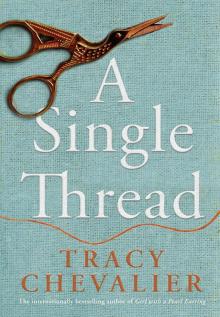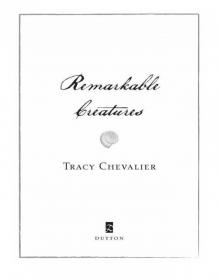- Home
- Tracy Chevalier
Falling Angels Page 8
Falling Angels Read online
Page 8
Soon after, I made my excuses and left, still furious with her. It was only afterward that I remembered I had not properly spoken to her about curtailing Livy’s cemetery visits. She is impossible—I shall never understand her. If I am honest, nor do I wish to.
FEBRUARY 1906
Maude Coleman
I know every inch of the cemetery now. I know it better than my own garden. Mummy does take us there all the time, even after school in winter when it is already getting dark and we have not asked to go.
Of course it is great fun playing there. We find Simon first, and if he is free he comes with us for a bit. We play hide-and-seek, and tour the angels (there are two new ones), and sometimes we sit at our graves and Lavinia tells stories about the people buried in the cemetery. She has an old guide to the cemetery that she likes to read from, about the girl whose dress caught fire, or the lieutenant-colonel killed in the Boer War described as “brave and kindhearted,” or the man who died in a railway accident. Or she simply makes up stories, which I find rather tedious but which Simon likes. I haven’t the imagination she has. I am more interested in the plants and trees, or the kind of stone used for the memorials; or, if Ivy May is with us, I test her reading using words on the graves.
I do not know what Mummy does while we play—she wanders off and I rarely see her until she comes looking for us when it is time to go. She says it is good for us to take the air, and I suppose she is right, but I am sometimes cold and, I admit, a little weary of the place. It is funny to think how desperate I used to be to get to the cemetery when I wasn’t allowed to, and yet now that I go there all the time, it is no longer quite so special.
Kitty Coleman
He will not have me. I am mad for him but he will not have me.
For almost two years I have visited the cemetery solely for the purpose of seeing him. And yet he will not take me.
I was careful at first—although I sought him out I did not want it to appear so. I always took the girls with me, then let them go off to play and pretended to be looking for them when really I was looking for him. I have paced up and down the paths, appearing to be fascinated by the merits of Roman versus plain crosses, or obelisks in Portland stone versus granite, or the names on graves chiseled into the stone versus fastened on with metal letters. I do not know what the workers there think of me, but they have grown used to my presence, and always nod respectfully.
I have learned a great deal about the cemetery that I did not know before. I know where they dump the extra soil displaced by coffins, and where the timber is kept for shoring up the deep graves, and the green rugs they place around freshly dug graves to look like grass. I know which gravediggers sing as they work, and where they hide their bottles of spirits. I have seen the ledgers and the detailed maps, each plot numbered, used to record graves. I have grown used to the horses pulling stones about the place. I have come to know the cemetery as an industry rather than as a place of spiritual contemplation.
He runs it as if it were an immaculate passenger ship crossing the ocean. He can be hard and brutal if necessary with the staff—some of the men are very rough indeed. But I think he is fair, too, and he respects good work.
Above all, he is kind to me without making me feel a lesser person.
We talk about all sorts of things—about the world and how it works, and about God and how He works. He asks my opinions, and does not laugh at them, but considers them. He is how I had always hoped Richard would turn out to be. But I made the mistake of thinking my husband would change when we married; instead he became more entrenched.
John Jackson is not a handsome man. He is not a prosperous man, though he is not poor either. He is not from a good family. He does not attend supper parties or the theater or openings to exhibitions. He is not an educated man, though he is learned—when he showed me Michael Faraday’s grave in the Dissenters he was able to explain his experiments with magnetic fields far better than Richard or even my brother could have.
He is a truthful man, a religious man, a principled man, a moral man. It is those last qualities that have undone me.
I am not accustomed to being turned down. Not that I have offered myself as such before, but I enjoy flirting and expect a response, else I would not do it. But he does not flirt. When I tried to with him, early on, he said he does not like coquettes, that he only wants the truth, and I stopped. And so over several months—constantly interrupted by his cemetery duties—I told him what little there is to tell of my small life: of how much I miss my late parents and brother, of my dull despair, of my impossible search for a place by the fire that is neither too hot nor too cold. (Only a few things I have kept from him—my knowledge of how to avoid having a baby, my cold bed, the New Year’s Eves Richard insists upon. He would be disgusted by the latter. Myself, I am not disgusted so much as resigned.)
When, at last, in the autumn after a summer of what felt like a courtship, I told him in clear terms what I was prepared to do, he said no.
I stopped going to the cemetery for a time then, sending Jenny with the girls when they wanted to go. But I could not keep away. And so for this past year we have again seen each other, but not as often and without the heightened expectations. It is painful, but he has upheld his principles, and I have come to accept that they are more important than me.
So we meet, and he speaks kindly to me. Today he said to me that he has always wanted a sister and now he has one. I did not reply that I have already had a brother and don’t want another.
APRIL 1906
Lavinia Waterhouse
It is so nice to have someone to mourn properly. And now I am eleven and old enough to wear a proper mourning dress, it is even better. Dear Auntie would have been so touched to see me dressed like this, and Papa got tears in his eyes when he saw me “looking so much like his dear sister.”
I have studied The Queen and Cassells very carefully so that I will not make any mistakes, and I have even written my own manual to help out other girls in my position who may have questions about the correct etiquette for mourning. I asked Maude to help me but she was not interested. Sometimes she will go on about constellations, or planets, or stones she has found in the heath, or plants in her mother’s garden, until I just want to scream.
So I have had to do it all myself. I think it has turned out very well—at least Mama says so. I have written it in my best script on black-edged paper, and I got Ivy May to draw an angel on the cover. Her drawing is quite good, and the book looks very handsome. I am going to copy the text below so that I shall always have it.
The Complete Guide to Mourning Etisuette by Miss Lavinia Ermyntrude Waterhouse
It is a very sad thing when someone dies. We mark the occasion with mourning. We wear special black clothes and black jewelry, we use special stationery for letters, and we do not go to parties or concerts.
Mourning lasts different lengths of time depending upon the loved one who has died.
The Widow mourns the longest because she is the saddest. What a terrible thing it is to lose a husband! She mourns for 2 years—18 months full mourning, 6 months half-mourning. Some ladies mourn for longer. Our own late Queen wore mourning for her husband Albert for the rest of her life—forty years!
How sad it is for a mother to lose her child, or a child her mother. They mourn for 1 year.
For brothers and sisters—6 months
For grandparents—6 months
Uncles and aunts—2 months
Great-uncles and great-aunts—6 weeks
First cousins—4 weeks
Second cousins—3 weeks
Clothing
It is very important to obtain proper mourning clothes. They must be new, and they must be burned after mourning, because it is bad luck to keep them in the house.
Jay’s on Regent Street is where all good London families buy their mourning clothes.
Ladies wear dresses made of best paramatta silk and trimmed with crape for full mourning of their husbands, pare
nts, or children. For grandparents and brothers and sisters, ladies wear plain black silk trimmed with crape. For everyone else ladies wear black with no crape.
Ladies wear black gloves and carry white handkerchiefs edged with black.
After a time they can take off the crape. This is called “slighting” the mourning.
Then there is half-mourning. Ladies wear gray or lavender or violet, or black-and-white stripes. Their gloves are gray as well.
Jewelry
During full mourning ladies may wear jet brooches and earrings. The brooches may be adorned with the hair of the loved one. In half-mourning ladies may wear a little gold, silver, and pearls and diamonds.
Stationery
Paper for writing must have a black edge. It is very important that the edge should be wide enough to honor the loved one, but not so wide as to be vulgar.
Gentlemen
Gentlemen wear what they normally wear to work but also wear black hatbands, black cravats, and black gloves. They do not wear jewelry.
Chlidren (under ten)
Children may wear black if they wish, but most often they wear white dresses, and sometimes lavender or mauve or gray. They may wear gloves. Children over ten should wear full mourning.
Maude Coleman
When we went up to the cemetery today they were taking apart the Waterhouse grave. I knew the funeral for Lavinia’s aunt was the next day, but I had thought they would be digging the grave later in the day. It was strange to see Simon and his pa working on one of our graves rather than a stranger’s. I had always thought of our graves as solid and indestructible, but now I know that you can take a crowbar to them and pull them apart, and even knock down an angel in the process.
Lavinia took my arm when she saw the group of men around the grave, and I wondered if she was going to make a scene. I was rather weary of her, I must confess. Since her aunt died she has talked of nothing but black clothes and when she can begin wearing jewelry again—even though she is hardly allowed to wear any anyway! The mourning rules of conduct are quite ferocious, from what she says. I don’t think I would be very good at it. I would break rules all the time without even knowing it.
Then Mummy suddenly shouted, “John!” I have never heard her shout so loudly. We all jumped, and next thing I knew Simon’s pa had shoved Mr. Jackson and sent him flying. And then the Waterhouse angel hit the ground.
It was all very strange. For the longest time I couldn’t connect any of the things I saw. I did not understand why Simon’s pa pushed Mr. Jackson and why Mr. Jackson, looking very pale, then thanked him for it. I did not understand why the angel had fallen. And I did not understand why Mummy knew Mr. Jackson’s Christian name.
When I saw that the angel’s head had broken from its body I found it hard not to laugh. Lavinia fainted, of course. Then Simon ran off with the angel’s head under his arm and I did taugh—it made me think of the poem about Isabella burying her lover’s head in the pot of basil.
Luckily Lavinia didn’t hear me laugh—she had woken up and was busy being sick. Mummy made a surprising fuss over her, putting her arm round her and handing her a handkerchief.
Lavinia stared at Mummy’s handkerchief. “Oh no, I must use my own mourning handkerchief,” she said.
“It doesn’t matter,” Mummy said. “Really it doesn’t.”
“Are you sure?”
“God won’t strike you dead for using a plain handkerchief.”
“But it’s not to do with God,” Lavinia said very earnestly. “It’s about respecting the dead. My auntie would be so hurt if she thought I wasn’t thinking of her in everything I do.”
“I shouldn’t think your auntie would want to be thought of while you’re wiping your mouth after being sick.”
Ivy May giggled. Lavinia frowned at her.
“Things are changing,” Mummy said. “No one expects you or your father or mother to go through full mourning any longer. You may not remember this, but King Edward limited the mourning period for his mother to three months.”
“I remember. But my mother wore black for longer than anyone else. And I would feel ashamed if I didn’t wear black for my auntie.”
“May I be of assistance, madam?” Mr. Jackson asked, standing over them.
“Could you order a cab to take us home, please,” Mummy said without looking at him.
Mr. Jackson went off to whistle for a cab. By the time he had returned Lavinia was standing, but she was still very pale and shaken.
“Shall we bring her down to the courtyard?” Mr. Jackson asked. “Can you walk, young lady, or would you like me to carry you?”
“I can walk,” Lavinia said. She took a few wobbly steps. Mummy slipped her arm around Lavinia’s shoulders and Mr. Jackson took her elbow. They began to go slowly down the path toward the entrance. As Ivy May and I trailed after them, I noticed that Mummy’s and Mr. Jackson’s hands seemed to be touching under Lavinia’s upper arm. I wasn’t entirely sure, and I thought for a moment of asking Ivy May what she saw, but then decided against it.
Mr. Jackson had to carry Lavinia down the steps to the courtyard, and then she insisted she was well enough to walk on her own. When we got to the front gate a hansom was waiting for us, which was not very big for four people, even if three of us were girls. I suppose it was the first cab to be found. Mr. Jackson handed Lavinia in—really he had to lift her, she was so weak. Then he turned and handed me in, and then Ivy May. Ivy May sat on my lap so that there would be room for Mummy. She sat very still, without wriggling. She is a solid little bundle, but I liked having her there, and put my arms round her to keep her steady. It made me wish I had a brother or sister to sit on my lap from time to time.
Mr. Jackson handed my mother in and shut the door for her. She opened the window, and he leaned in for a moment to say, “Good-bye, young ladies. I do hope you feel better, miss,” he added, nodding at Lavinia. “We’ll have your angel up again in no time.”
Lavinia hardly looked at him, but leaned back and closed her eyes.
Then, as the wheels began to turn, I heard someone say in a low voice, “Tomorrow.” I thought it must be Mr. Jackson adding that the angel would be ready in time for the funeral the next day.
Mummy must have heard it, too, for she sat up suddenly, as if Miss Linden at school had come around with her ruler and prodded her in the side the way she does to us during comportment lessons.
Then we were whizzing down the hill, and I spotted Simon coming out of the mason’s yard, without the angel’s head. He saw us, too, and from the corner of my eye I watched him sprint alongside the hansom until he could not keep up any longer.
Simon Field
This is what happens. I see it all.
When we slide the marble slab off the Waterhouse grave, we has to pry it loose from the base of the plinth where the angel stands. Joe and I are doing it, with our pa and Mr. Jackson watching. Mr. Jackson’s giving advice the way he likes to do. I want to tell him we knows what we’re doing, but he’s the guvnor—he can say what he likes.
Joe’s working at the slab with a crowbar and he leans against the plinth to put his weight behind the bar. Now, Joe’s a big strong man and his back’s pushing that plinth, and before you know it the plinth starts moving. Them masons must’ve made a mess of the foundation when they put it in for that to happen. I been digging at the cemetery six years and never seen one shift so.
Worse’n that, the mortar holding the angel to the base of the plinth ain’t strong. I see the angel wobble back and forth.
“Joe,” I says, “stop.”
Joe stops with the crowbar but he’s still leaning against the plinth, and the angel wobbles again. I can see the crack in the mortar now, but before I can say something the angel starts to topple. I hear a woman shout just as the angel falls sideways and hits the Coleman urn. The head cracks right off, and it falls one way and the body the other. In fact the body falls right where Mr. Jackson’s standing, ‘cept he ain’t there now ’cause our pa’s
knocked him right out the way.
It all happens slow and fast too. Then Kitty Coleman and the girls run up to us. Livy takes one look at the headless angel and shrieks and faints, which is nothing new. Mrs. C. helps up Mr. Jackson—his face is all pale and sweaty. He’s breathing heavy and he takes out a kerchief and wipes his face. Then he looks at the base of the plinth and the cracked mortar, clears his throat, and says, “I’m going to strangle that mason with my bare hands.”
I know what he means.
Then he says, “Thank you, Paul,” real quiet and solemn to our pa. It sounds funny ‘cause he never calls our pa by his name.
Our pa just shrugs. “Dunno what they need an angel up there for anyways,” he says. “Urns and angels and columns and whatnot. Bloody nonsense. When you’re dead you’re dead. You don’t need an angel to tell you that. Give me a pauper’s grave any day.” Our pa taps one of the paupers’ wood crosses. “My pa were buried in one and that’ll suit me too.”
“Just as well,” Mr. Jackson says, “for that’s where you’re likely to end up.”
You might think our pa would be offended, but something in the way Mr. Jackson says it makes our pa smile. The guvnor smiles, too, and it’s a funny sight, given he’s just almost been struck down dead. It’s like they’re mates sitting over a jar in the pub, laughing at a joke.
“Anyhows, best see to the girlie,” our pa says then, nodding at Livy. Maude’s crouching by her, and Mrs. C. goes over to her too. Livy sits up. She’s all right—she always is.
Ivy May’s standing next to me. “You should have marked that angel,” she says.

 Girl With a Pearl Earring
Girl With a Pearl Earring A Single Thread
A Single Thread Reader, I Married Him: Stories Inspired by Jane Eyre
Reader, I Married Him: Stories Inspired by Jane Eyre The Last Runaway
The Last Runaway Burning Bright
Burning Bright Remarkable Creatures
Remarkable Creatures At the Edge of the Orchard
At the Edge of the Orchard The Virgin Blue
The Virgin Blue The Lady and the Unicorn
The Lady and the Unicorn Falling Angels
Falling Angels New Boy
New Boy Reader, I Married Him
Reader, I Married Him Girl with a Pearl Earring, The
Girl with a Pearl Earring, The